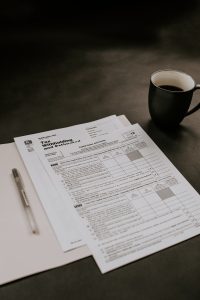If you are involved in forex trading, you need to understand the tax implications of your activity. Forex trading can be a profitable venture, but it is also subject to various tax rules and regulations. As such, it is important to have a good grasp of how to do taxes for forex to avoid any legal issues or penalties.
Forex trading is the buying and selling of currencies with the aim of making a profit. It is a highly speculative and volatile market, and traders often make profits or losses within short periods. Tax rules regarding forex trading vary depending on the jurisdiction, but there are some general principles that apply in most countries.
Firstly, it is important to keep accurate records of all your forex trading activities. This includes records of all trades, profits, and losses, as well as any fees or expenses incurred. Keeping good records is essential when it comes to calculating your taxes and staying on the right side of the law.
In most countries, forex trading is treated as capital gains taxation. This means that any profits made from forex trading are subject to capital gains tax, while losses may be used to offset any capital gains tax liability. The tax rate varies depending on the jurisdiction, but in most cases, it is higher than the income tax rate.
To calculate your capital gains tax liability, you need to determine your net capital gain for the year. This is calculated by subtracting your total losses from your total gains. If your net capital gain is positive, you will be liable to pay capital gains tax. If it is negative, you may be able to carry forward your losses to offset any future capital gains tax liability.
It is important to note that different countries have different tax laws regarding forex trading. For example, in the United States, forex traders are required to file a Form 8949 and Schedule D with their tax returns. These forms are used to report any gains or losses made from forex trading.
In the UK, forex trading is subject to capital gains tax, but there are also other taxes that may apply. For example, if you are trading forex as a business, you may be liable for income tax and national insurance contributions. If you are unsure about your tax obligations, it is recommended to seek the advice of a tax professional.
Another important consideration when it comes to forex trading and taxes is the treatment of forex losses. In most countries, forex losses can be used to offset any capital gains tax liability. This means that if you make a loss in forex trading, you may be able to reduce your tax liability by offsetting the loss against any capital gains made in other investments.
In conclusion, forex trading can be a lucrative venture, but it is important to understand the tax implications of your activity. To do taxes for forex, you need to keep accurate records of all your trading activities, including profits, losses, fees, and expenses. You also need to be aware of the tax laws in your jurisdiction and how they apply to forex trading. If you are unsure about your tax obligations, it is recommended to seek the advice of a tax professional. By staying on top of your tax obligations, you can avoid any legal issues or penalties and ensure that you are maximizing your profits from forex trading.






